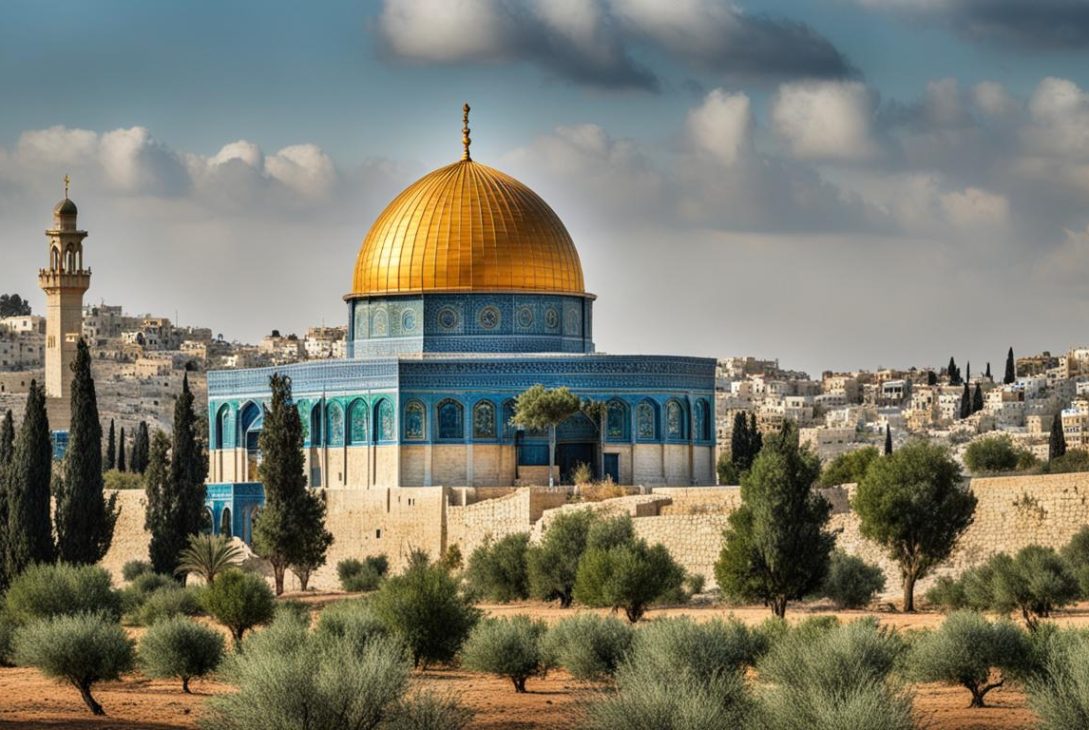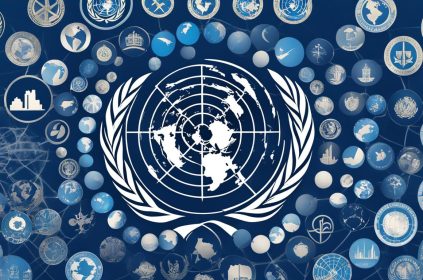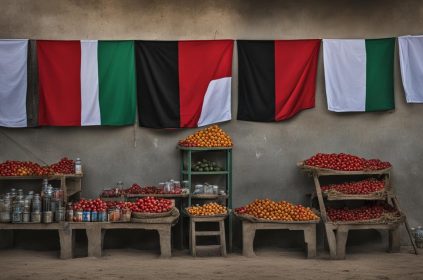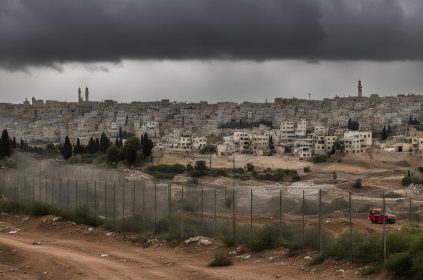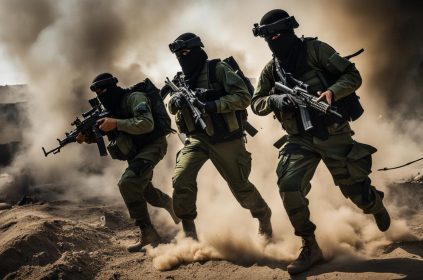The Palestinian Authority (PA) holds a pivotal role in the Palestinian territories, encompassing the West Bank and the Gaza Strip. As a self-governing body, the PA faces various challenges while striving to represent the interests of the Palestinian people. In this article, we delve into the key insights and perspectives surrounding the Palestinian Authority, shedding light on its historical context, role in governance, challenges faced, and the international dynamics that shape its existence.
Key Takeaways
- The Palestinian Authority plays a central role in the governance of the Palestinian territories, including the West Bank and the Gaza Strip.
- Understanding the historical context of Palestine is crucial to comprehending the complexities of the Palestinian Authority.
- The PA aims to assume responsibilities within the framework of a comprehensive political solution that includes the West Bank, East Jerusalem, and the Gaza Strip.
- The PA faces challenges such as allegations of graft, security cooperation, and a leadership succession crisis.
- The United States, as a mediator, emphasizes the importance of the Palestinian perspective and aspirations in the Israeli-Palestinian conflict.
The Historical Context of Palestine
Understanding the history of Palestine is crucial to grasping the complexities of the Palestinian Authority. The events and narratives that have shaped the region provide valuable insights into the current political landscape. A key event in Palestinian history is the Nakba, or the mass forced displacement of Palestinians, which occurred during the 1948 Arab-Israeli War. This event, discussed by Edward Said in his book “The Question of Palestine,” resulted in the displacement of hundreds of thousands of Palestinians and the establishment of the state of Israel.
Orientalism, a concept explored by Said, further sheds light on the misrepresentation of Palestine in Western discourse. Orientalist perspectives have often portrayed Palestine as a barren land before Zionist immigration, perpetuating a false narrative that disregards the rich cultural and historical heritage of the region. Walid Khalidi’s book “Before Their Diaspora” challenges this misrepresentation by showcasing late Ottoman and British Mandate Palestine as a vibrant and culturally diverse place.
Documentaries such as “The Al-Nakba: The Palestinian Catastrophe” provide comprehensive insights into the root causes of the Israel-Palestine conflict, delving into the historical context and the impact of colonialism on the Palestinian people. By understanding the historical context of Palestine, we gain a deeper appreciation for the complexities of the Palestinian Authority and the aspirations of the Palestinian people.
Orientalism and the Misrepresentation of Palestine
“Orientalism has perpetuated the misrepresentation of Palestine as a barren land, erasing its vibrant cultural heritage and complex history.”
Key Events in Palestinian History
- The Nakba: The mass forced displacement of Palestinians during the 1948 Arab-Israeli War
- The establishment of the state of Israel
Recommended Books on Palestine History
| Book Title | Author |
|---|---|
| “The Question of Palestine” | Edward Said |
| “Before Their Diaspora” | Walid Khalidi |
The Role of the Palestinian Authority and the Gaza Strip
The Palestinian Authority (PA) plays a crucial role in shaping the future of the Gaza Strip amidst ongoing discussions on governance and post-Hamas reconstruction efforts. As emphasized by top U.S. diplomat Antony Blinken, the PA is considered a potential governing body for the Gaza Strip in the aftermath of Hamas’ destruction. The PA’s immediate priorities include securing a ceasefire, facilitating the entry of much-needed aid into Gaza, and restoring essential services.
In line with the aspirations of the Palestinian people, the PA aims to assume broader responsibilities within the framework of a comprehensive political solution that encompasses the West Bank, East Jerusalem, and the Gaza Strip. This vision aligns with the goal of establishing a sustainable peace and addressing the long-standing humanitarian crisis in the region. Discussions also underline the importance of humanitarian pauses and the release of hostages as part of the larger effort to stabilize the region and ensure the well-being of its inhabitants.
“The Palestinian Authority is a potential governing body for the Gaza Strip, with responsibilities that extend beyond immediate post-conflict reconstruction efforts.”
To effectively fulfill its role, the Palestinian Authority must navigate through complex challenges, such as allegations of graft, security cooperation with Israel, and the succession crisis surrounding aging and ailing leader Mahmoud Abbas. Moreover, the PA faces opposition from Hamas, the militant group that controls the Gaza Strip. Despite these obstacles, the PA’s involvement remains vital for the realization of the Palestinian people’s aspirations and the prospects of a comprehensive and lasting resolution to the Israeli-Palestinian conflict.
The Role of the Palestinian Authority and the Gaza Strip
The table below provides a brief overview of the key aspects related to the role of the Palestinian Authority and the governance of the Gaza Strip:
| Key Aspects | Description |
|---|---|
| Future of Gaza | The Palestinian Authority is considered a potential governing body for the Gaza Strip, taking into account post-Hamas reconstruction efforts. |
| Humanitarian Pauses | Temporary ceasefires to allow for the provision of humanitarian aid and assistance to the Gaza population. |
| Hostage Release | Efforts to secure the release of individuals held hostage and promote the restoration of peace and stability in the Gaza Strip. |
| Gaza Ceasefire | The establishment of a lasting ceasefire between conflicting parties to minimize violence and facilitate peace negotiations. |
| Aid into Gaza | Enabling the entry of essential aid, resources, and reconstruction supplies into the Gaza Strip to address the urgent humanitarian needs of the population. |
| Palestinian Aspirations | Advocating for the realization of the Palestinian people’s aspirations for self-determination, statehood, and a just resolution to the conflict. |
| Gaza Governance | The PA’s involvement in governing and stabilizing the Gaza Strip, ensuring the provision of essential services and infrastructure. |
The table provides a concise summary of the key factors and objectives related to the role of the Palestinian Authority in Gaza. Through its engagement, the PA aims to address the immediate and long-term needs of the population, promote stability, and contribute to a comprehensive political solution.
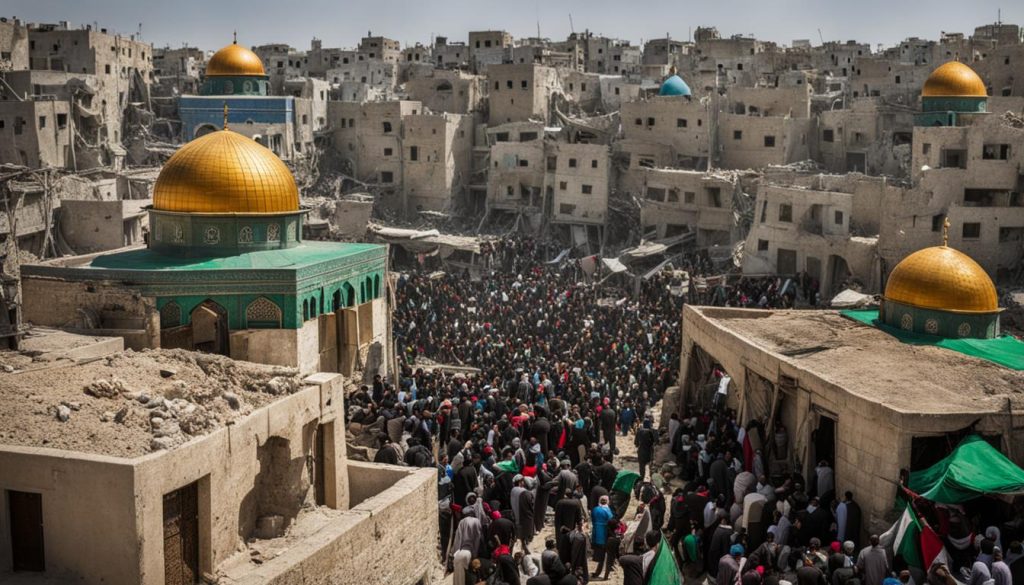
Challenges Facing the Palestinian Authority
The Palestinian Authority (PA) has encountered numerous challenges in its governance and pursuit of a comprehensive political solution in the Israeli-Palestinian conflict. These challenges have had significant implications for the PA’s legitimacy, leadership, and relations with other stakeholders.
One of the main challenges faced by the PA is the persistent allegations of graft and corruption. These allegations have undermined public trust in the authority and raised concerns about the mismanagement of resources meant for the welfare of Palestinians. The PA has been working to address these allegations and implement measures to enhance transparency and accountability.
Additionally, security cooperation with Israel poses a challenge for the PA. While this cooperation has been essential for maintaining relative stability in the West Bank, it has been criticized by some Palestinians who perceive it as collaborating with the occupier. Striking a balance between security cooperation and addressing the aspirations of Palestinians for self-determination has remained a complex task for the PA.
“The Palestinian Authority’s challenges go beyond internal governance issues. The question of succession to Mahmoud Abbas, the aging and ailing leader, looms large. This presents uncertainties and potential power struggles within Palestinian political circles, which could further hinder the authority’s effectiveness,” says an expert on Middle Eastern affairs.
Table: Challenges Facing the Palestinian Authority
| Challenge | Description |
|---|---|
| Graft and Corruption Allegations | Accusations of corruption and mismanagement of resources affect the PA’s credibility and popular support. |
| Security Cooperation | Security cooperation with Israel is necessary for stability but raises concerns among Palestinians who view it as compromising their aspirations for self-determination. |
| Succession Question | The aging and ailing Abbas raises uncertainties and potential power struggles within Palestinian political circles. |
| Hamas Opposition | The presence and opposition of Hamas, a rival Palestinian faction, further complicates the PA’s governance and decision-making. |
Furthermore, opposition from Hamas, a rival Palestinian faction, poses a significant challenge to the PA’s authority. The power struggle between Fatah, the party leading the PA, and Hamas has resulted in political deadlock and hindered efforts towards Palestinian unity. Finding a way to reconcile differences and establish a unified Palestinian front remains a key challenge.
Despite these challenges, the Palestinian Authority continues to navigate the complex landscape with the aim of addressing the aspirations and concerns of the Palestinian people. It remains to be seen how the PA will overcome these hurdles and effectively steer the path towards a just and sustainable resolution in the Israeli-Palestinian conflict.
The U.S. Perspective on the Israeli-Palestinian Conflict
Antony Blinken, the top U.S. diplomat, underscores the significance of considering the Palestinian perspective and aspirations in discussions on the Israeli-Palestinian conflict. Blinken emphasizes the need for a comprehensive political solution that addresses the grievances and aspirations of both parties involved. As the U.S. role as a mediator, Blinken urges Israel to consider humanitarian pauses to mitigate the impact on Palestinian civilians and calls for the release of hostages. Additionally, he sends a clear message to any entity seeking to exploit the conflict to threaten U.S. personnel in the region.
The United States is committed to working towards the establishment of a Palestinian state and the realization of Palestinian aspirations. Blinken reiterates the importance of a comprehensive peace agreement that encompasses a two-state solution, with Israel living side by side with a viable and sovereign Palestinian state. The U.S. recognizes the threats posed by Iran-aligned militias and affirms its commitment to ensure the security and stability of Israel and the broader region.
Antony Blinken emphasizes the importance of the Palestinian perspective in discussions on the Israeli-Palestinian conflict, stressing the need for a comprehensive political solution and urging Israel to consider humanitarian pauses. He sends a strong message to any entity seeking to exploit the conflict to threaten U.S. personnel in the region.
As a mediator, the U.S. is actively engaged in diplomatic efforts to promote dialogue and facilitate negotiations between the parties. The U.S. is committed to working with Israel, the Palestinian Authority, and other key regional stakeholders to advance the prospects for peace. The ongoing commitment to Palestinian statehood and the pursuit of a comprehensive political solution demonstrate the U.S.’s dedication to a just and lasting resolution of the Israeli-Palestinian conflict.
U.S. Perspective on the Israeli-Palestinian Conflict
| Key Points | |
|---|---|
| The U.S. emphasizes the importance of the Palestinian perspective and aspirations | Recognition of the need for a comprehensive political solution and consideration of humanitarian pauses |
| Commitment to working towards the establishment of a Palestinian state | Affirmation of support for the security and stability of Israel and the region |
| The U.S. acts as a mediator in diplomatic efforts and negotiations | Engagement with stakeholders to advance the prospects for peace |
Books for Understanding the Israeli-Palestinian Conflict
To gain a deeper understanding of the Israeli-Palestinian conflict, various books offer unique perspectives. These books delve into the complexities of the conflict, exploring topics such as the origins of the conflict, the role of Hamas, Israeli intelligence operations, targeted assassinations, and the peace process. By engaging with these works, readers can gain valuable insights into the multifaceted dynamics of the Israeli-Palestinian conflict.
Understanding Hamas
One significant aspect of the conflict is the role of Hamas, a Palestinian political and military organization. To grasp the complexities of Hamas and its impact on the conflict, reading “Hamas: Politics, Charity, and Terrorism in the Service of Jihad” by Matthew Levitt is highly recommended. This book provides an in-depth analysis of Hamas’s history, ideology, and activities, shedding light on its role within the larger Israeli-Palestinian conflict.
Israeli Intelligence and Targeted Assassinations
Israeli intelligence operations have played a significant role in shaping the conflict. Ronen Bergman’s “Rise and Kill First: The Secret History of Israel’s Targeted Assassinations” offers a comprehensive exploration of Israeli intelligence agencies and their use of targeted assassinations. This book provides valuable insights into the strategies and tactics employed by Israel, unraveling the intricate web of intelligence operations that have influenced the course of the conflict.
The Origins of the Conflict
Understanding the historical context of the Israeli-Palestinian conflict is crucial. “Palestine: Peace Not Apartheid” by Jimmy Carter provides a comprehensive overview of the conflict, delving into the historical foundations and the challenges faced by Palestinians. Carter’s firsthand experiences and insights offer a nuanced perspective on the origins and complexities of the conflict.
| Book | Author | Description |
|---|---|---|
| “Hamas: Politics, Charity, and Terrorism in the Service of Jihad” | Matthew Levitt | An in-depth analysis of Hamas’s history, ideology, and activities, shedding light on its role within the larger Israeli-Palestinian conflict. |
| “Rise and Kill First: The Secret History of Israel’s Targeted Assassinations” | Ronen Bergman | A comprehensive exploration of Israeli intelligence agencies and their use of targeted assassinations, unraveling the intricate web of intelligence operations that have influenced the course of the conflict. |
| “Palestine: Peace Not Apartheid” | Jimmy Carter | A comprehensive overview of the conflict, delving into the historical foundations and the challenges faced by Palestinians, offering a nuanced perspective on the origins and complexities of the conflict. |
By engaging with these books, readers can broaden their understanding of the Israeli-Palestinian conflict, gaining insights into various aspects that shape the ongoing tensions and complexities.
The Palestinian Perspective in Literature
Literature offers a unique and nuanced perspective on the Israeli-Palestinian conflict, providing insights into the experiences and narratives of Palestinians. Palestinian authors such as Sayed Kashua, David Grossman, Eshkol Nevo, Dorit Rabinyan, Etgar Keret, and Raja Shehadeh have crafted powerful works that shed light on various aspects of the conflict.
Sayed Kashua
Sayed Kashua’s short story “Cinderella” explores the challenge of integration in divided narratives. Through his poignant writing, Kashua delves into the complexities faced by Palestinians living in Israel, highlighting the struggles of identity and belonging.
David Grossman
David Grossman’s novel “To the End of the Land” portrays the trauma experienced by Israeli and Palestinian families affected by the conflict. With his compelling storytelling, Grossman delves into the human cost of war and the enduring search for peace.
Eshkol Nevo
Eshkol Nevo’s “Homesick” provides a complex narrative set in a former Arab village transformed into a Jewish village. The novel explores themes of identity, memory, and the transformative power of place, offering a unique perspective on the complexities of coexistence.
Dorit Rabinyan
Dorit Rabinyan’s “All the Rivers” tells a modern-day Romeo and Juliet story between a Palestinian man and an Israeli woman. The novel delves into the complexities of love, cultural differences, and the barriers imposed by the Israeli-Palestinian conflict.
Etgar Keret
Etgar Keret’s short story “Cocked and Locked” addresses the moral and political complexities of the conflict. Through his dark humor and introspective tales, Keret offers a fresh perspective on the human condition in the midst of conflict.
Raja Shehadeh
Raja Shehadeh’s “Palestinian Memoir” offers profound insights into the Palestinian experience. As a prominent Palestinian writer and lawyer, Shehadeh shares personal stories and reflections on the struggle for justice and self-determination.
These works of Palestinian literature offer readers a deeper understanding of the Israeli-Palestinian conflict, humanizing the experiences of both Palestinians and Israelis. Through their powerful narratives, these authors provide alternative perspectives that challenge mainstream discourse and foster empathy and dialogue.
| Author | Notable Work |
|---|---|
| Sayed Kashua | “Cinderella” |
| David Grossman | “To the End of the Land” |
| Eshkol Nevo | “Homesick” |
| Dorit Rabinyan | “All the Rivers” |
| Etgar Keret | “Cocked and Locked” |
| Raja Shehadeh | “Palestinian Memoir” |
Israeli Perspective in Literature
Israeli literature offers a diverse range of insights into the complex realities of the Israeli-Palestinian conflict. Authors like Walid Khalidi, Benny Brunner, Alexandra Jansse, Ella Shohat, Matt Frei, and Ayelet Gundar-Goshen have contributed to the rich literary landscape that explores various perspectives and experiences.
“Israeli literature provides a nuanced understanding of the conflict, delving into historical, social, and cultural dimensions,” says Walid Khalidi, an influential Palestinian scholar.
Benny Brunner and Alexandra Jansse’s documentary “The Promise” sheds light on the Israeli occupation by intertwining past and present narratives. Ella Shohat’s collection of essays, “Taboo Memories, Diasporic Voices,” offers a critical analysis of Eurocentric perspectives, challenging dominant narratives. Matt Frei’s book recommendations, including Simon Sebag Montefiore’s “Jerusalem: A Biography,” provide historical context and understanding of the region. Ayelet Gundar-Goshen’s novels explore complex narratives and humanism in the Israeli context.
Exploring Israeli literature allows readers to delve into the intricate layers of the conflict, gaining new insights and perspectives that go beyond political discourse. These literary works provide a window into the complexities and nuances of Israeli society and its relationship with the Palestinian narrative.
| Author | Work |
|---|---|
| Walid Khalidi | Challenges the narrative that Palestine was a desert before Zionist immigration. |
| Benny Brunner and Alexandra Jansse | Documentary “The Promise” intertwines past and present narratives, shedding light on the Israeli occupation. |
| Ella Shohat | Collection of essays “Taboo Memories, Diasporic Voices” offers a critique of Eurocentric perspectives. |
| Matt Frei | Book recommendations, including Simon Sebag Montefiore’s “Jerusalem: A Biography,” offer historical context and understanding. |
| Ayelet Gundar-Goshen | Novels explore complex narratives and humanism in the Israeli context. |
Understanding U.S.-Palestinian Relations
The U.S.-Palestinian relations have a significant impact on the Israeli-Palestinian conflict. To gain insights into this complex relationship, Nathan Thrall’s book “A Day in the Life of Abed Salama” provides a compelling examination of the structural oppression and bottlenecks faced by Palestinians under Israeli occupation. The book focuses on the tragic story of a traffic accident and the challenges faced by emergency services due to Israeli checkpoints, highlighting the daily struggles and realities experienced by Palestinians.
Washington’s influence in the region plays a crucial role in shaping U.S.-Palestinian relations. Analyzing the dynamics of this relationship is essential to understanding the broader context of the conflict. The current Palestinian leadership crisis adds another layer of complexity to the relationship, as the U.S. navigates diplomatic challenges and seeks to promote stability and peace in the region.
To develop a comprehensive understanding of the conflict, it is crucial to delve into the narratives and experiences of both Palestinians and Israelis. By exploring the books, insights, and perspectives of authors such as Nathan Thrall, a more nuanced understanding of U.S.-Palestinian relations can be achieved, shedding light on the complexities and challenges that contribute to the Israeli-Palestinian conflict.
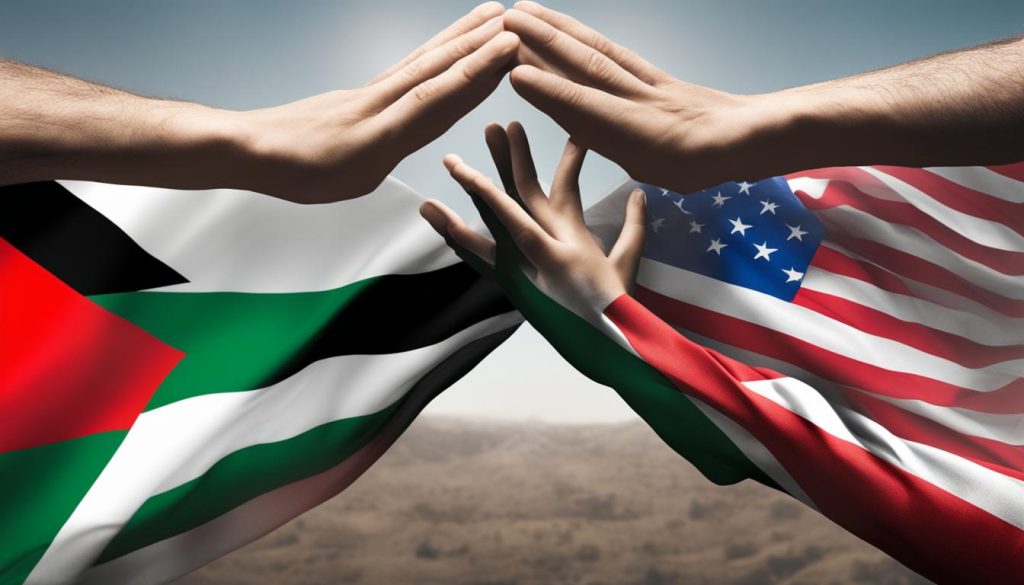
Key Insights:
- Nathan Thrall’s book “A Day in the Life of Abed Salama” provides an in-depth examination of structural oppression and bottlenecks faced by Palestinians.
- Understanding the influence of Washington in the region is crucial in comprehending U.S.-Palestinian relations.
- The current Palestinian leadership crisis adds complexity to the relationship, impacting diplomatic efforts for peace.
- Exploring literature and diverse perspectives helps develop a comprehensive understanding of U.S.-Palestinian relations in the context of the Israeli-Palestinian conflict.
| U.S.-Palestinian Relations | Insights |
|---|---|
| Book | “A Day in the Life of Abed Salama” by Nathan Thrall |
| Focus | Structural oppression and bottlenecks faced by Palestinians under Israeli occupation |
| Impact | Provides insights into the daily struggles and realities experienced by Palestinians |
| Washington’s influence | Crucial in shaping U.S.-Palestinian relations |
| Palestinian leadership crisis | Complexifies the relationship and impacts diplomatic efforts |
| Literature insights | Exploring diverse perspectives for a comprehensive understanding |
The Role of Settlements in the Israeli-Palestinian Conflict
Israeli settlements in the West Bank have been a contentious issue in the Israeli-Palestinian conflict. Gershom Gorenberg’s book, The Accidental Empire, provides valuable insights into the history and expansion of settlements, shedding light on the ideological agenda that has fueled their growth.
Settlement expansion has resulted in a significant increase in the settler population, creating challenges for the prospects of a two-state solution and the overall peace process. The presence of settlements in the West Bank has complicated negotiations and made it more difficult to establish a viable Palestinian state.
“Settlement expansion has significantly increased the settler population, creating obstacles to the peace process and further complicating the prospects for a two-state solution.”
The impact of settlements extends beyond their physical presence. They have led to the displacement of Palestinian communities, the confiscation of land, and the fragmentation of Palestinian territory. Moreover, their existence has perpetuated a cycle of violence and deepened divisions between Israelis and Palestinians.
| Impact of Settlements | Effects |
|---|---|
| Land Confiscation | Displacement of Palestinian communities |
| Fragmentation | Division of Palestinian territory |
| Obstacles to Peace | Increase in tensions and violence |
Efforts to reach a resolution to the Israeli-Palestinian conflict must address the issue of settlements. The international community has called for a freeze on settlement construction, considering it a violation of international law. Resolving the settlement issue is crucial for creating conditions conducive to a just and lasting peace between Israelis and Palestinians.
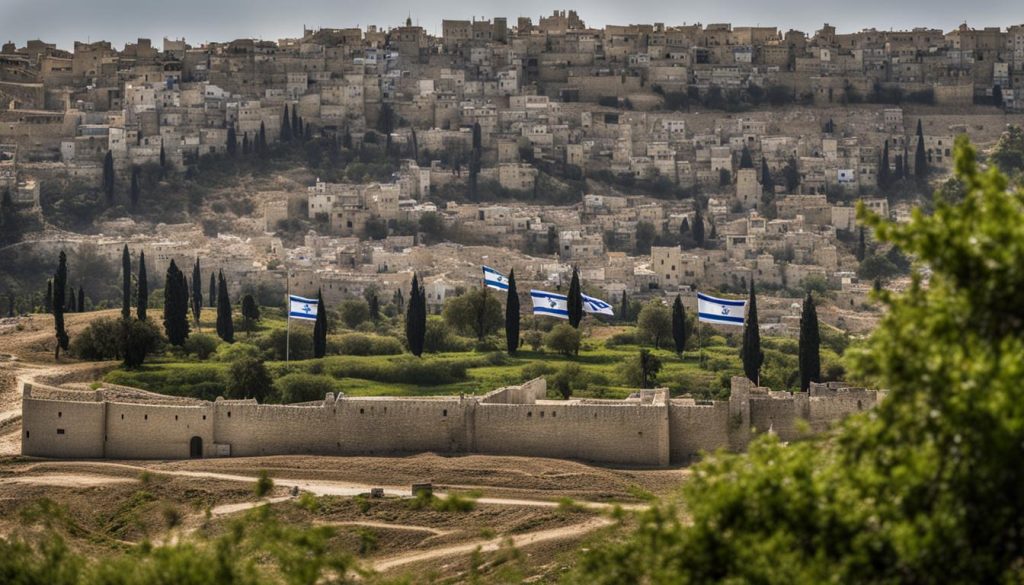
Conclusion
Understanding the role of the Palestinian Authority (PA) and the historical context of the Israeli-Palestinian conflict is crucial in gaining insights into the complexities of the situation. The PA, with its limited self-rule in the West Bank, plays a key role in discussions on the future governance of the Gaza Strip. As advocated by top U.S. diplomat Antony Blinken, the PA is seen as a potential governing body for Gaza after the destruction of Hamas. However, the PA faces challenges such as allegations of graft and security cooperation with Israel, which have affected its credibility.
Literature offers valuable insights into the perspectives of both Palestinians and Israelis. Works by authors like Sayed Kashua, David Grossman, and Raja Shehadeh provide nuanced narratives that shed light on the experiences and complexities of the conflict. These literary works humanize the conflict and offer alternative viewpoints to the mainstream discourse.
The impact of Israeli settlements in the West Bank cannot be overlooked. Settlement expansion, fueled by ideological agendas, has significantly increased the settler population and further complicated the prospects for a two-state solution. Settlements present a major obstacle to the Israeli-Palestinian peace process.
The relationship between the United States and the Palestinians also plays a significant role in the conflict. Understanding this complex relationship, as well as Washington’s role as a mediator, provides insight into the broader context of the conflict. It is essential to analyze these factors in order to foster a better understanding of the conflict and explore potential paths towards resolution.
FAQ
What is the role of the Palestinian Authority in the future of the Gaza Strip?
The Palestinian Authority (PA) is seen as a key player in discussions on the governance of Gaza after the destruction of Hamas. The PA aims to assume responsibilities within the framework of a comprehensive political solution that includes the West Bank, East Jerusalem, and the Gaza Strip.
What are the challenges facing the Palestinian Authority?
The Palestinian Authority has faced challenges with allegations of graft, security cooperation with Israel, and a declining popularity. The aging and ailing leader, Mahmoud Abbas, also raises uncertainties surrounding his succession.
What is the U.S. perspective on the Israeli-Palestinian conflict?
The United States, represented by Antony Blinken, emphasizes the importance of the Palestinian perspective and aspirations in discussions on the conflict. The U.S. is committed to working towards the establishment of a Palestinian state and the realization of Palestinian aspirations.
Are there any recommended books to understand the Israeli-Palestinian conflict?
Yes, books like “The Accidental Empire” by Gershom Gorenberg, “Rise and Kill First” by Ronen Bergman, and “Palestine: Peace Not Apartheid” by Jimmy Carter provide insights into various aspects of the conflict, including the settlement movement, targeted assassinations, and the challenges faced by Palestinians.
Are there any literary works that offer different perspectives on the conflict?
Yes, literature such as Sayed Kashua’s “Cinderella,” David Grossman’s “To the End of the Land,” and Eshkol Nevo’s “Homesick” provide nuanced narratives and explore the experiences of both Palestinians and Israelis. These works shed light on the complexities and human stories within the conflict.
How do U.S.-Palestinian relations impact the peace process?
The complex relationship between the U.S. and the Palestinians plays a significant role in the peace process. Understanding this relationship and the dynamics of Washington’s influence is crucial in comprehending the broader context of the conflict.
What is the role of Israeli settlements in the conflict?
Israeli settlements in the West Bank have significantly complicated the peace process. The expansion of settlements has increased the settler population and created obstacles to a two-state solution. Gershom Gorenberg’s book “The Accidental Empire” provides in-depth insights into the settlement movement and its impact on the conflict.
Source Links
- https://www.theguardian.com/world/2023/nov/12/experts-guide-to-the-israel-palestine-conflict
- https://foreignpolicy.com/2023/10/22/israel-hamas-war-books-about-palestinians-gaza-history-conflict/
- https://www.reuters.com/world/blinken-visits-west-bank-meet-palestinian-leader-abbas-gaza-war-rages-2023-11-05/
gaza strip conflict israeli military operation missile attacks in israel political unrest in palestine Understanding the Palestinian Authority: Key Insights and Perspectives
Last modified: January 17, 2024


